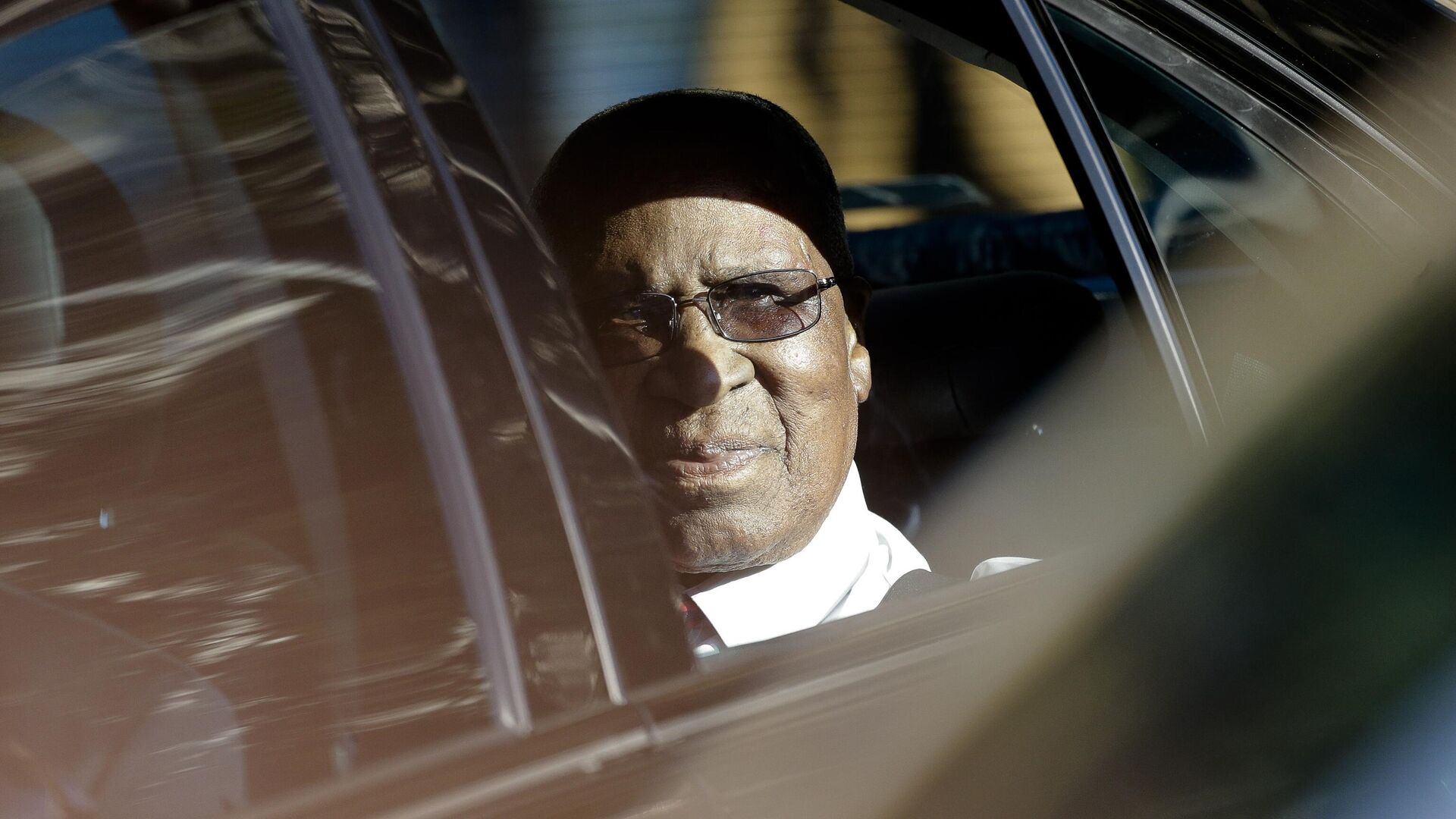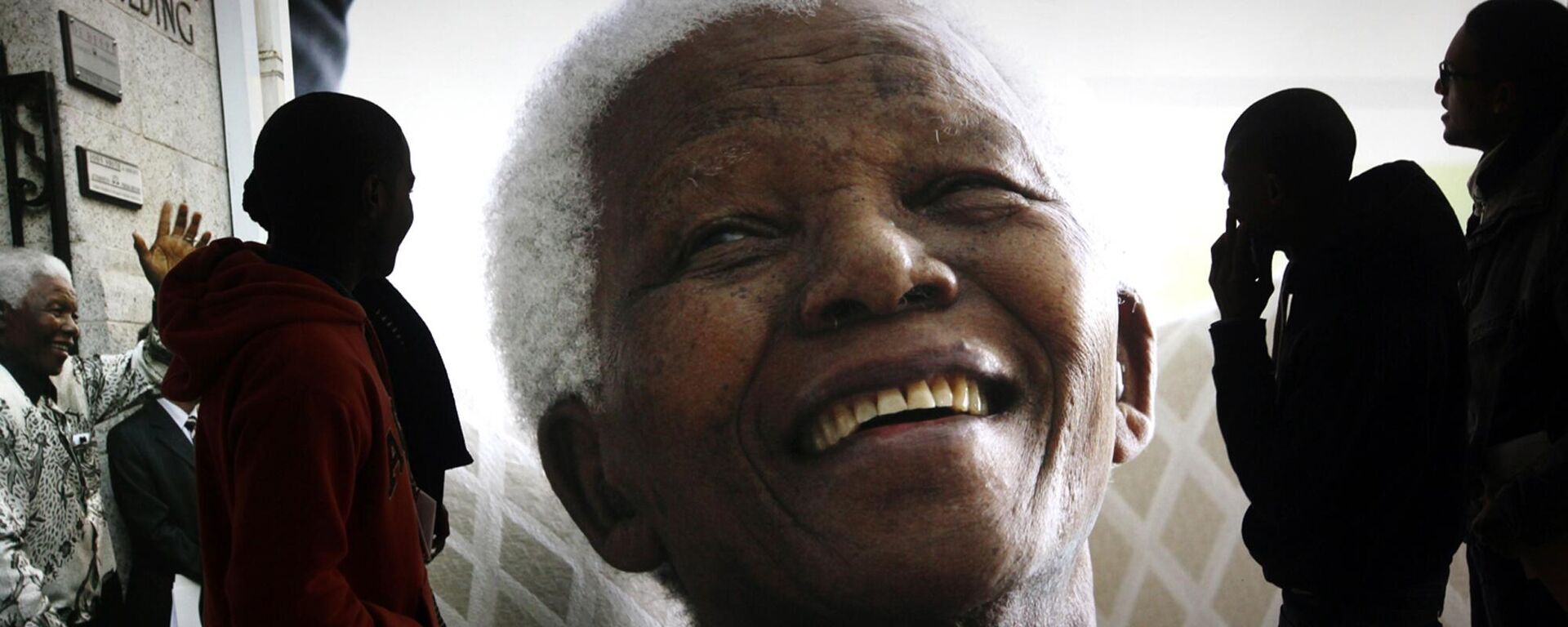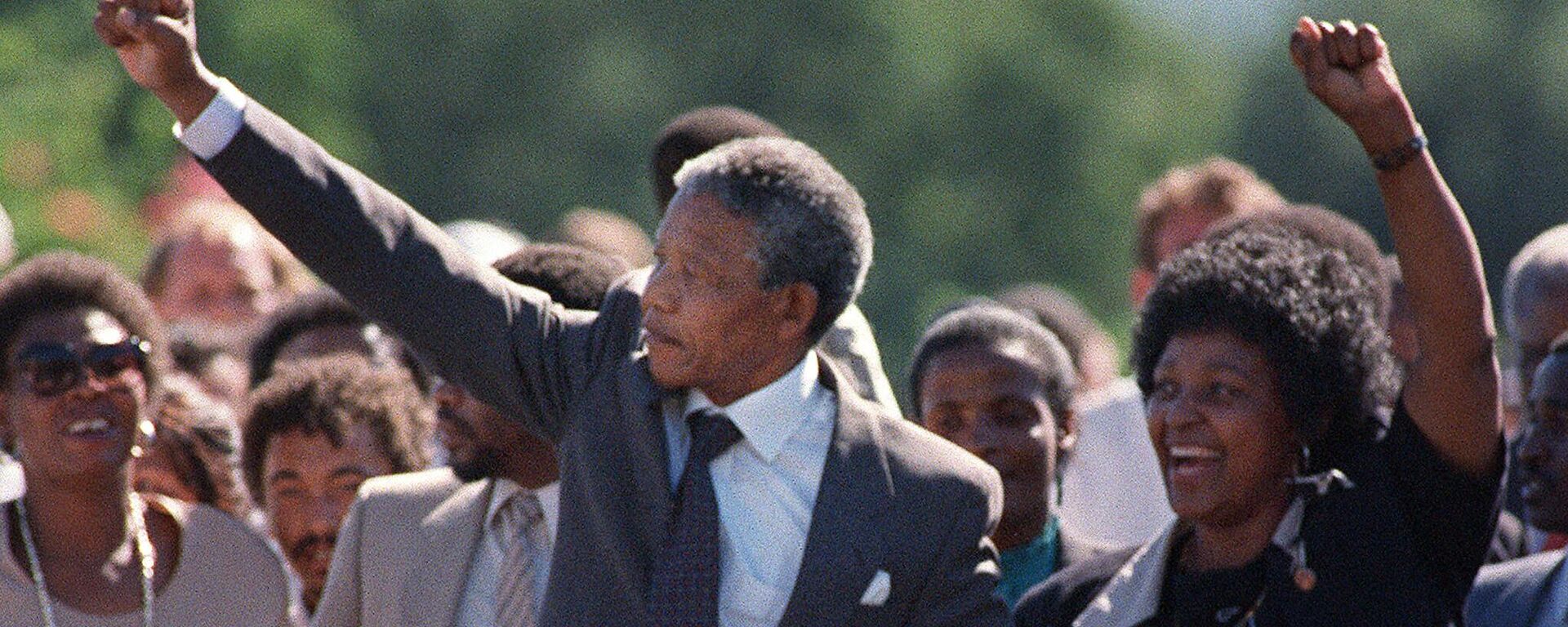https://en.sputniknews.africa/20230721/anti-apartheid-fights-unsung-hero-honoring-andrew-mlangeni-on-third-death-anniversary-1060671927.html
Anti-Apartheid Fight's Unsung Hero: Honoring Andrew Mlangeni on Third Death Anniversary
Anti-Apartheid Fight's Unsung Hero: Honoring Andrew Mlangeni on Third Death Anniversary
Sputnik Africa
July 21 marks the third anniversary of the death of South African anti-apartheid activist Andrew Mlangeni who was convicted and imprisoned along with former... 21.07.2023, Sputnik Africa
2023-07-21T16:39+0200
2023-07-21T16:39+0200
2023-07-21T16:44+0200
southern africa
south africa
apartheid
anti-apartheid struggle
andrew mlangeni
anniversary
death
features
https://cdn1.img.sputniknews.africa/img/07e7/07/15/1060679135_0:0:3073:1728_1920x0_80_0_0_adab8b7b4ef49bae90decb839f8dc4ed.jpg
Andrew Mlangeni was born in 1925 in Bethlehem, a town in the South African province of Free State, formerly known as Orange Free State. He joined the African National Congress (ANC) in 1951 and became a member of its secret armed wing, Umkhonto we Sizwe (MK), in 1961.He was later sent by the ANC leadership to China for military training and returned to South Africa in 1963, where he was arrested and charged with sabotage and conspiracy to overthrow the white minority government supported by Western powers.Mlangeni was sentenced to life imprisonment along with Nelson Mandela and other ANC leaders in the infamous Rivonia Trial, which took place between October 9, 1963, and June 12, 1964. He spent 26 years in prison, mostly on Robben Island, where he endured harsh conditions and brutal treatment as prisoner 467/64.The anti-apartheid activist was released in 1989, four years before the end of apartheid in South Africa. He later went on to serve as an ANC member of parliament from 1994 to 2014.A Comrade and FriendMlangeni was a close friend of Mandela's and spoke at his memorial service following the former South African president's death in 2013. It's believed that after the death of his longtime friend, Mlangeni began to feel strongly that his death was imminent.He also advocated for reconciliation and social justice, criticizing corruption and inequality in post-apartheid South Africa. The anti-apartheid figure received several honors, including the Freedom of the City of London and honorary doctorates from various universities around the world.In 2015, South African film director Lebogang Rasethaba made a documentary about Mlangeni's life called "Prisoner 467/64: The Untold Legacy of Andrew Mlangeni."Mlangeni, also known as Rev. Mokete Mokoena, died on July 21, 2020, at the age of 95. He is being remembered as a man of principle and humility who dedicated his life to the struggle for freedom and democracy in South Africa.The Great ComplicityMlangeni's life and legacy serve as a reminder of the long and bitter struggle against apartheid, a system of racial segregation and oppression that lasted for nearly half a century. Apartheid was not only enforced by the racist white minority government in South Africa but also supported by many Western countries, especially during the Cold War era.The apartheid government aligned itself with the US-led North Atlantic Treaty Organization (NATO) and its policy of regional containment against Soviet-backed activities worldwide. By the late 1960s, the rise of pro-Soviet states on the African continent, as well as Soviet aid to anti-apartheid movements, was seen as a threat by the West.Richard Nixon's and Ronald Reagan's US, Margaret Thatcher's Britain, as well as France, Germany and other Western countries, maintained diplomatic, economic and military ties with the apartheid regime in South Africa despite its human rights violations and international condemnation. They provided arms, technology, intelligence, and loans to the racist government, while imposing sanctions and embargoes on its opponents. They also vetoed or abstained from several UN resolutions calling for action against apartheid.Western complicity in apartheid is believed to have been motivated by strategic interests, such as access to natural resources, trade markets, naval bases, and regional allies. It was also influenced by ideological factors such as anti-communism, racism, colonialism, and paternalism.However, not all Western countries were equally supportive of apartheid. Some were more critical and vocal than others, such as Canada, Norway, Sweden, Denmark, Finland, Iceland, and the Netherlands. These countries provided moral and financial support to the ANC and other anti-apartheid groups. They also imposed sanctions and boycotts on the white minority regime in South Africa and pressured other countries to do the same.In addition, many Western citizens opposed their governments' policies toward South Africa and joined the global anti-apartheid movement. They organized protests, demonstrations, petitions, campaigns, concerts, fundraisers, solidarity groups, and educational programs to raise awareness and demand action against apartheid. They also supported divestment from companies doing business with South Africa and boycotts of South African products.The end of apartheid in 1994 was a historic victory for humanity. It is seen the triumph of democracy over tyranny, of freedom over bondage, of dignity over humiliation, of justice over injustice, of peace over war, of love over hate.
https://en.sputniknews.africa/20230718/nelson-mandela-day-2023-south-africans-lasting-heritage-1060608688.html
https://en.sputniknews.africa/20230612/prepared-to-die-for-equal-society-nelson-mandelas-journey-of-struggle-sacrifice-and-triumph-1059844942.html
southern africa
south africa
Sputnik Africa
feedback@sputniknews.com
+74956456601
MIA „Rossiya Segodnya“
2023
Muhammad Nooh Osman
https://cdn1.img.sputniknews.africa/img/07e7/04/0a/1058467512_0:0:1280:1280_100x100_80_0_0_ec723833bcbfcaed2e21952965ad99e4.jpg
Muhammad Nooh Osman
https://cdn1.img.sputniknews.africa/img/07e7/04/0a/1058467512_0:0:1280:1280_100x100_80_0_0_ec723833bcbfcaed2e21952965ad99e4.jpg
News
en_EN
Sputnik Africa
feedback@sputniknews.com
+74956456601
MIA „Rossiya Segodnya“
Sputnik Africa
feedback@sputniknews.com
+74956456601
MIA „Rossiya Segodnya“
Muhammad Nooh Osman
https://cdn1.img.sputniknews.africa/img/07e7/04/0a/1058467512_0:0:1280:1280_100x100_80_0_0_ec723833bcbfcaed2e21952965ad99e4.jpg
southern africa, south africa, apartheid, anti-apartheid struggle, andrew mlangeni, anniversary, death
southern africa, south africa, apartheid, anti-apartheid struggle, andrew mlangeni, anniversary, death
Anti-Apartheid Fight's Unsung Hero: Honoring Andrew Mlangeni on Third Death Anniversary
16:39 21.07.2023 (Updated: 16:44 21.07.2023) Muhammad Nooh Osman
Writer/Editor
July 21 marks the third anniversary of the death of South African anti-apartheid activist Andrew Mlangeni who was convicted and imprisoned along with former South African President Nelson Mandela and others in the infamous Rivonia Trial of 1964. Mlangeni was the last surviving co-defendant of Mandela.
Andrew Mlangeni was born in 1925 in Bethlehem, a town in the South African province of Free State, formerly known as Orange Free State. He joined the African National Congress (ANC) in 1951 and became a member of its secret armed wing, Umkhonto we Sizwe (MK), in 1961.
He was later sent by the ANC leadership to China for military training and returned to South Africa in 1963, where he was arrested and charged with sabotage and conspiracy to overthrow the white minority government supported by Western powers.
Mlangeni was sentenced to life imprisonment along with
Nelson Mandela and other ANC leaders in the infamous Rivonia Trial, which took place between October 9, 1963, and June 12, 1964. He spent 26 years in prison, mostly on Robben Island, where he endured harsh conditions and brutal treatment as
prisoner 467/64.
The anti-apartheid activist was released in 1989, four years before the end of apartheid in South Africa. He later went on to serve as an ANC member of parliament from 1994 to 2014.
Mlangeni was a close friend of Mandela's and spoke at his
memorial service following the former South African president's death in 2013. It's believed that after the death of his longtime friend, Mlangeni began to feel strongly that his death was imminent.
"We are not going to be separated for a long time though, because I will also be following soon," Mlangeni said after the death of his comrade Mandela.
He also advocated for reconciliation and social justice, criticizing corruption and inequality in post-apartheid South Africa. The anti-apartheid figure received several honors, including the Freedom of the City of London and honorary doctorates from various universities around the world.
In 2015, South African film director Lebogang Rasethaba made a documentary about Mlangeni's life called "Prisoner 467/64: The Untold Legacy of Andrew Mlangeni."
Mlangeni, also known as Rev. Mokete Mokoena, died on July 21, 2020, at the age of 95. He is being remembered as a man of principle and humility who dedicated his life to the struggle for freedom and democracy in South Africa.
Mlangeni's life and legacy serve as a reminder of the long and bitter struggle
against apartheid, a system of racial segregation and oppression that lasted for nearly half a century. Apartheid was not only enforced by the racist white minority government in South Africa but also supported by many Western countries, especially during the Cold War era.
The apartheid government aligned itself with the US-led North Atlantic Treaty Organization (NATO) and its policy of regional containment against Soviet-backed activities worldwide. By the late 1960s, the rise of pro-Soviet states on the African continent, as well as Soviet aid to anti-apartheid movements, was seen as a threat by the West.
Richard Nixon's and Ronald Reagan's US, Margaret Thatcher's Britain, as well as France, Germany and other Western countries, maintained diplomatic, economic and military ties with the apartheid regime in South Africa despite its human rights violations and international condemnation.
They provided arms, technology, intelligence, and loans to the racist government, while imposing sanctions and embargoes on its
opponents. They also vetoed or abstained from several UN resolutions calling for action against apartheid.
Western complicity in apartheid is believed to have been motivated by strategic interests, such as access to natural resources, trade markets, naval bases, and regional allies. It was also influenced by ideological factors such as anti-communism, racism, colonialism, and paternalism.
However, not all Western countries were equally supportive of apartheid. Some were more critical and vocal than others, such as Canada, Norway, Sweden, Denmark, Finland, Iceland, and the Netherlands. These countries provided moral and financial
support to the ANC and other anti-apartheid groups. They also imposed sanctions and boycotts on the white minority regime in South Africa and pressured other countries to do the same.
In addition, many Western citizens opposed their governments' policies toward South Africa and joined the global anti-apartheid movement. They organized protests, demonstrations, petitions, campaigns, concerts, fundraisers, solidarity groups, and educational programs to raise awareness and demand action against apartheid. They also supported divestment from companies doing business with South Africa and boycotts of South African products.
The end of apartheid in 1994 was a historic victory for humanity. It is seen the triumph of democracy over tyranny, of freedom over bondage, of dignity over humiliation, of justice over injustice, of peace over war, of love over hate.




